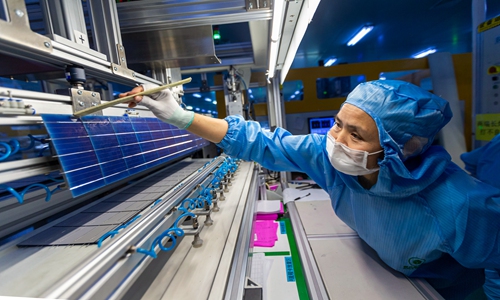SOURCE / INDUSTRIES
Unseating China from global supply chains 'pie in the sky'
Unseating China from supply chains ‘pie in the sky’

A staff member at a factory in East China's Jiangsu Province works on a photovoltaic product for export after resumed to work. Photo: cnsphoto
The Trump administration's intent to unseat China as the mainstay of global supply chains may be just pie in the sky, observers said, noting that China ought to open its economy even further while driving indigenous innovation to propel growth.
The Trump administration is pushing to rip global supply chains out of China as it weighs new tariffs on the grounds of China's handling of the COVID-19 outbreak, Reuters said in a report dated Monday, citing officials familiar with US planning.
The tariff and supply chain removal threats ahead of the November presidential election might prove futile, in that a wholesale push for the manufacturing of quality products at affordable prices in places other than China is unrealistic, said Bai Ming, deputy director of the international market research institute at the Chinese Academy of International Trade and Economic Cooperation, a think tank under the Ministry of Commerce.
The new threats, building on the issues of the trade imbalance and intellectual property rights that have prevailed since the US-initiated trade war began in 2018, reveal the US' deep-seated fear of China outdoing it in the international division of labor, Bai told the Global Times on Tuesday.
Fearing that China's industrial restructuring and upgrading would lay the groundwork for the economy's ascension to global leadership, the US has apparently ramped up efforts to "sabotage" China's position in global supply chains, he commented.
However ambitious the Trump administration's initiative seems, China continues to be the hub of global supply chains in the real world.
Take some Chinese companies including Warren Buffett-backed automaker BYD that have quickly risen to prominence in the arena of facial masks so as to leave a mark in the global fight against the pandemic.
That BYD is capable of becoming the world's top facial mask maker within a short while is inseparable from the nation's well-structured supply chains for mask manufacturing, a spokesperson of the Shenzhen-based company told the Global Times.
Making masks involves a range of industries such as chemicals, textiles, machinery, metallurgy, electronics, as well as raw materials, equipment, and facilities. China, as the only country in the world that possesses all industrial categories listed in the UN industrial classification, is home to upstream raw materials including polypropylene and polyester, middle and upstream items such as non-woven fabrics, melt-blown fabrics, nose bridges, mask sheeting machines and mask spot welding machines, according to the spokesperson.
The person stressed that it is such "hard power" that helps BYD to expand quickly into mask manufacturing.
What leaves China unfazed by the US' blackmail and intimidation is a continued push to open up the Chinese economy, contrary to the US' populist approach, rendering the Chinese market an essential destination for foreign investment and thereby counteracting administrative threats to force supply chains out of China, Bai said.
On top of that, China needs to bank on indigenous innovation as a cornerstone for growth, the expert emphasized, "so there would be viable backup plans in the event of a coerced [removal] of supply chains."

